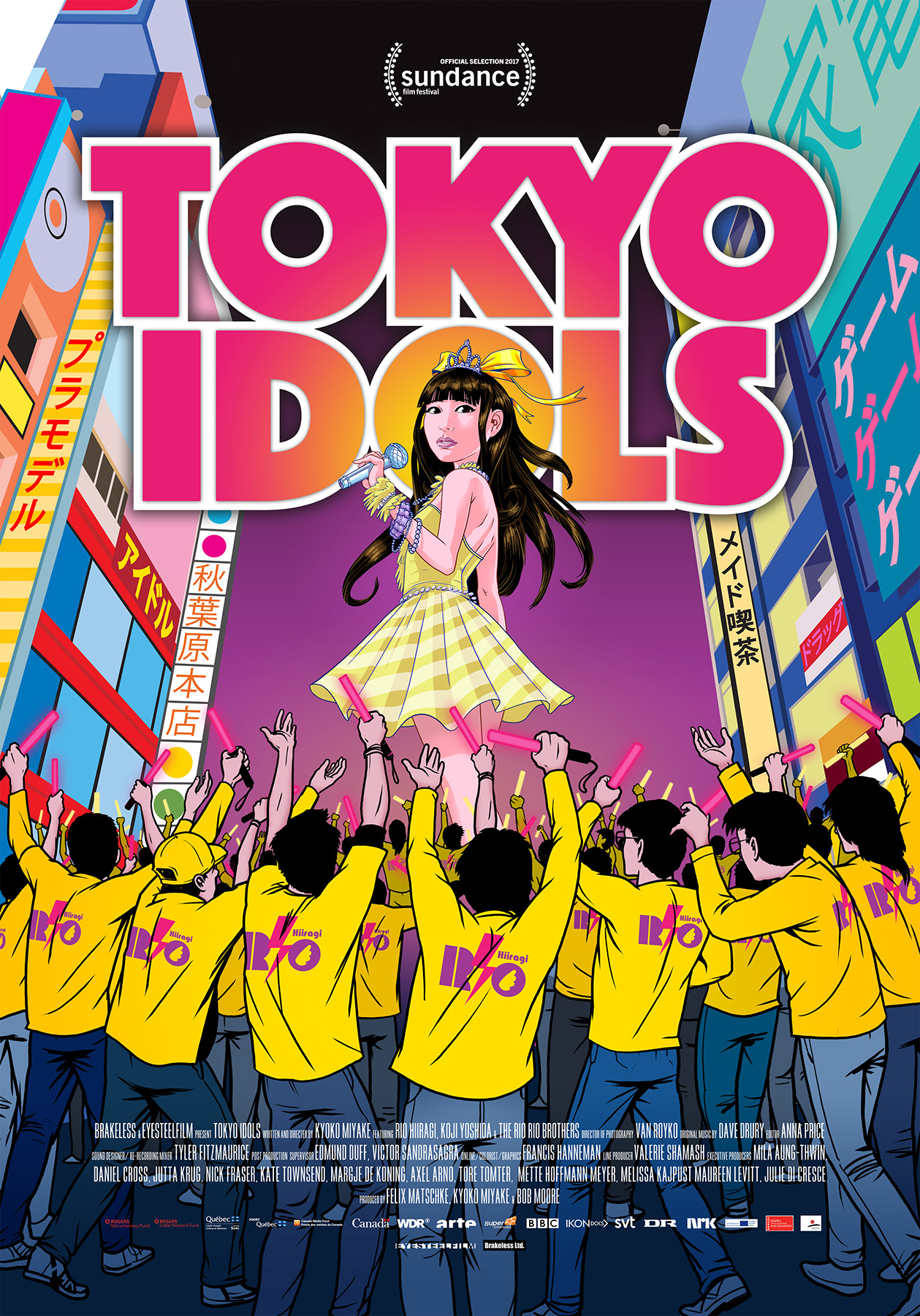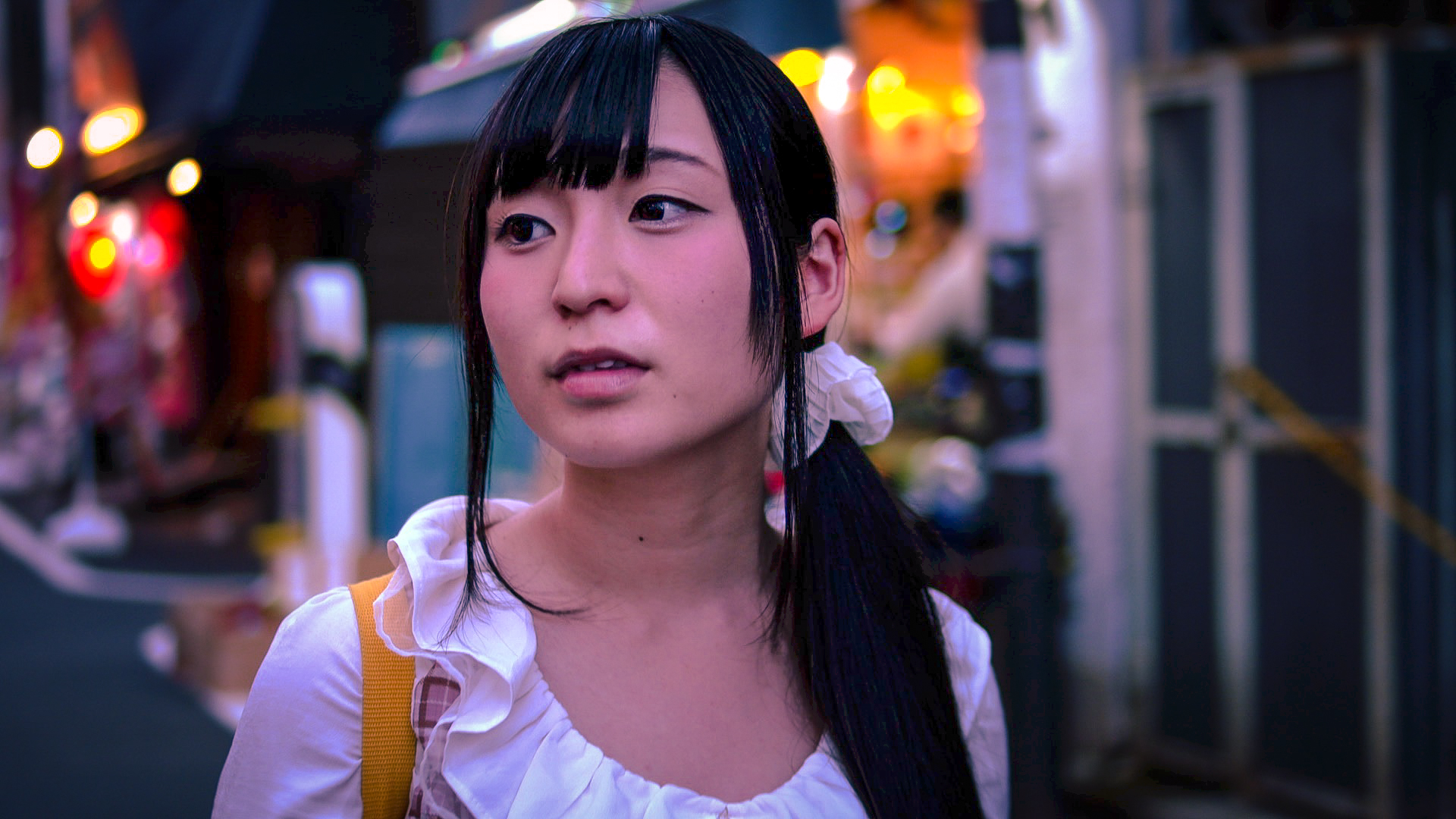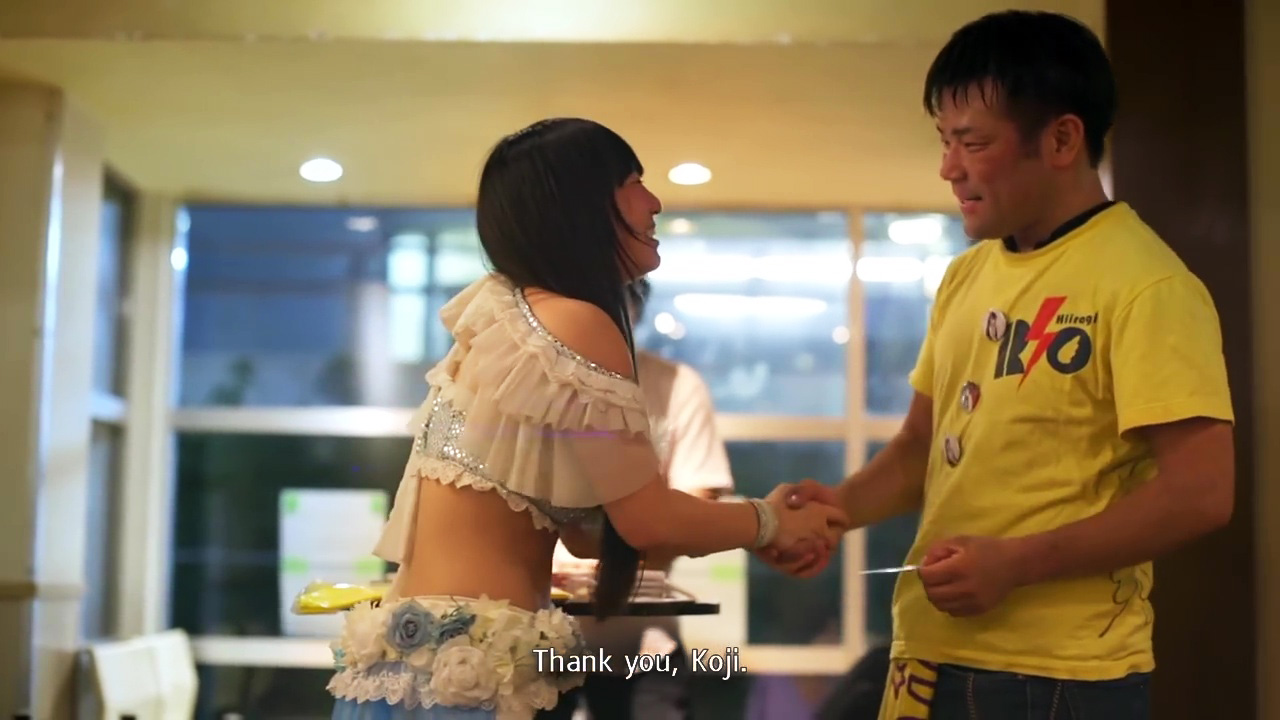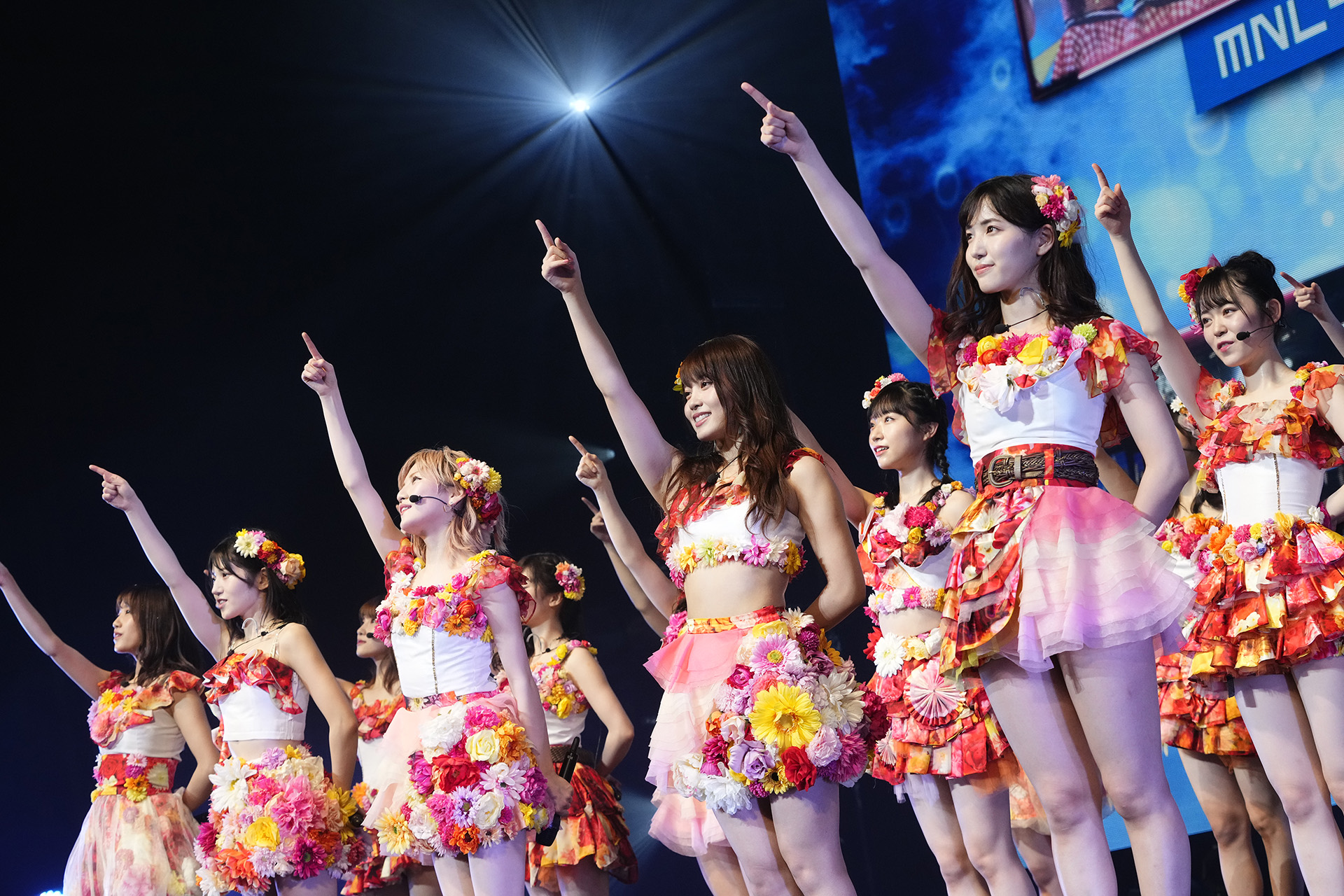Tokyo Idols
Film Review by David Cirone

Tokyo Idols has an agenda, and that’s no spoiler. Starting with its slanted description on Netflix, filmmaker Kyoko Miyake uses the documentary platform to selectively focus on fringe, negative aspects of idol fandom. For the millions of Japanese and international fans who have actually seen or participated in an idol concert, it’s clear that the film stops way short of presenting the whole truth.
Tokyo Idols focuses primarily on relatively unknown Japanese idol Rio Hiiragi. She’s hard-working, dreams of making it the top, and adores her fans. She’s pretty-much DIY — packing her own CDs, lamenting her broken shoes, and doing live webcasts from her tiny, plush-filled room in Tokyo. There’s nothing visually or musically special about her performances, and she performs on dark, bare bones stages with 10 to 15 fans in attendance.

The other main character of the film is her number one fan Koji (at 43 he’s over twice her age) who works in Akihabara in electronics. He goes to every show, devotes his free time and money to her exclusively, and runs the “Rio Brothers” supporters group, matching T-shirts and all. He’s the kind of fan every idol deserves — he respects her and doesn’t cross the line. His wish for her to do her best, by his own words, inspires him to be better.
If you watch the first twenty minutes of this film, you’ll know where this is headed. Performers and fans like Rio and Koji are certainly representative of a section of the idol world, but the film paints them in lonely silhouettes — there’s nothing to make you feel good about what they’re doing with their lives, and by extension, what the idol world represents.

Are there fans who take their idol worship too far emotionally and financially? Of course there are, but that’s present in any fandom, be it toys, music, DVDs, whatever. Tokyo Idols sets out to portray this as an inescapable norm, and that’s just false. Idol fans are made out to be lonely, obsessive, deranged outsiders. In Japan and overseas, most of the idol fans I’ve met (note: as a promoter and manager, I’ve personally met thousands) are normal, fun, balanced people who enjoy their happy idol experiences with restraint, respect, and kindness. There are professional male and females of all ages. Many men are in stable romantic relationships, some even married to a female partner who adores idols even more.
Where are the happy people in this film?
Likewise, we don’t get to see the point of view of successful idols or their managers. Maybe some were asked to participate in this documentary and declined, but my guess is the producers didn’t bother. They know better. Japanese managers and their artists insist on controlling the way their product is represented to the outside world — that’s an inescapable fact of the industry, and no worthwhile manager would allow their artists to be subjected to this negative spotlight.
The reason we get Rio (and other lower-level idols like P.IDL and Harajuku Monogatari) instead of AKB48, Morning Musume, or Momoiro Clover is because the indie idols are low-hanging fruit. What do they have to lose by cooperating with an international documentary? There are a few stolen shots of larger idol acts at a idol festivals, and some TV footage of AKB48’s 45th Single election, but the voices of successful artists and their managers are missing from this documentary.

Had the film focused on Rio and Koji, exploring the symbiotic relationship of indie idols and their fans, we might have seen an honest portrait of two people doing what makes them happy despite judgments from others. With “indies-only” access, the doc is inherently dishonest, claiming to examine the idol “world” when it really just stays in the corner.
The film attempts to bridge Rio’s efforts to the stadium-sized activities of AKB48 by showing her first solo show at Zepp Tokyo (skillfully shot to cover the lack of attendance — that hall is huge, but Rio’s show is 10% full), but she’s not ready for that venue.
AKB48 might be synonymous with the world’s current definition of Japanese idols, and the group gets a small section of the film devoted to them, but there’s nothing about their successes or influence. Instead we see a scene of AKB48 fans praying at shrine for the success of member Ryoka Oshima at the upcoming election. An older fan, whose apartment is later revealed to be full of AKB48 merchandise, laments “…she just turned 17 …that’s old for an idol.”
Out of context, this comes off really creepy. Q: Is this normal? (Western audiences don’t usually openly pray for their pop stars.) Is there sales data to back up the supposed 17-year-old idol age limit? We don’t know, because the film doesn’t take the time to give balance or objectivity — it wants you to see another dirty old man fixated on an underage performer, backed by voice-over messages of social conditioning and the need for sexuality to bring success in male dominant culture. True? Maybe — but no facts are presented, just more one-sided opinions.
A fan who carries stacks of photos with Harajuku Monogatari’s 14 year old Amu is even more off-putting: He confesses it feels sort of romantic. The older men who congregate to the concerts of pre-teen members of amorecarina don’t get a chance to explain themselves in their own words. Even when one of the mothers says she approves of the fans, that they treat her daughter like adopted fathers, the visuals linger too long on the stares of the older men during the performance.
There’s an interesting comment mid-film by cultural commentator Akio Nakamori, who coined the modern use of “otaku”, comparing today’s idol culture to the rise of punk and the Sex Pistols in 1970s London. The similarities aren’t immediately obvious, but he’s on point — both genres emerged from the cultural need to find emotional release. Rio’s fans and their “wota” chants are part of the Japanese salaryman syndrome, but that’s another cultural understanding that’s left out.

There are two brief, bright spots in the film. When Rio visits her parents in Chiba, they get a chance to voice their warm support and mature understanding of Rio’s goals. When Rio meets a seven-year-old female fan, their happy interaction is guaranteed to make you smile, and the conversation has special meaning for them both. FINALLY, over 70 minutes into the film, there’s a moment that doesn’t feel sad or despondent.
But it doesn’t last long — there’s a sequence at the end of the film that visually equates idols with hostess clubs, X-rated love pillows, and sex shops (with Love Live! displays, too, for an even sharper sting).
The foreign audience who doesn’t know anything about Japan except the “crazy” videos they see on YouTube might accept this film as true and objective due to its Japanese filmmaker authorship. But Tokyo Idols is an unbalanced and unfair snapshot of fans and performers. Director Miyake already knows the reaction she intends for the audience and spends 90 minutes delivering evidence to prove her point.
Tokyo Idols is streaming now on Netflix.



